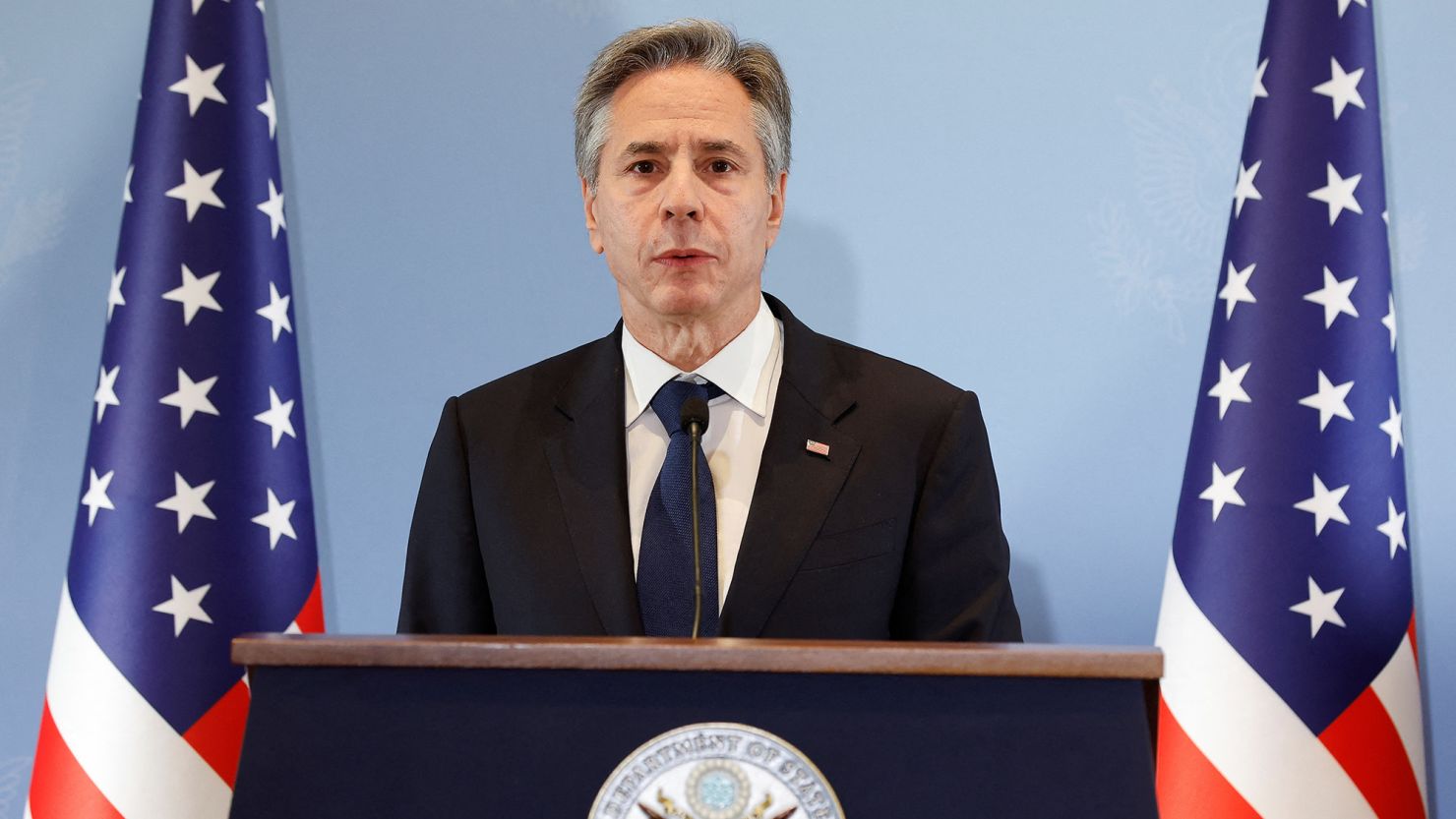US Secretary of State Antony Blinken on Friday issued a strong message after a day of meetings with Israeli leaders in Tel Aviv, declaring, “we need to do more to protect Palestinian civilians.”
In some of his most forceful comments to date, the top US diplomat said that “civilians should not suffer the consequences for (Hamas’) inhumanity and its brutality.”
Still, Blinken continued to offer support for Israel’s “right” and “obligation” to defend itself after the brutal October 7 Hamas attacks.
The top US diplomat, who appeared visibly shaken while speaking to the press, described seeing new graphic images and videos of the attacks, calling it “striking” and “shocking” that the brutality of the attack “has receded so quickly in the memories of so many.”
“Today, we saw additional images, additional footage collected by the Israeli government from video cameras, some the terrorists, some others and communities that were attacked,” Blinken said after viewing graphic footage, previously shown to journalists. “It remains almost beyond the human capacity to process, to digest.
On his fourth trip to the country since the October attack, Blinken met with Israeli Prime Minister Benjamin Netanyahu, President Isaac Herzog, and the country’s war cabinet. While he defended Israel’s right to respond to Hamas’ brutal attack, he delivered a message that suggests the Biden administration’s support for Israel’s approach is not limitless.
In his meetings, Blinken discussed the need for continued humanitarian aid to reach Gaza and efforts to get hostages freed from Hamas.
“We believe that each of these efforts would be facilitated by humanitarian pauses,” Blinken said.
However, Netanyahu publicly rejected the idea of a pause in fighting without the release of hostages first.
Speaking alongside Herzog earlier on Friday, Blinken reiterated that the way Israel conducts its operations matters.
Herzog sought to emphasize that Israel is following international humanitarian law. He showed Blinken a leaflet – 1.2 million of which he said had been sent to citizens of Gaza warning them to leave before military operations – and said Israel had “carried out six million text messages and four million phone calls to the citizens of Gaza according to the rules of international law, where we alerted the citizens in advance.”
‘Determined’ to free hostages
As protesters could be heard outside the meeting demanding the release of hostages, the top US diplomat said they “are determined to do everything we can to bring them back safely, to bring them back to be with their families and loved ones.”
“Our heart goes out to them. We understand it. We want their immediate release,” Herzog said.
Blinken said ahead of his departure Thursday, for the next stop of his trip in Jordan, that he planned to discuss “steps that need to be taken to protect civilians” but declined to provide details on those steps.
Privately, officials across the US government have warned their Israeli counterparts about the impact images of the devastation in Gaza – and the importance of allowing humanitarian aid in – on their ability to pursue their strategic aims as international condemnation grows wider and louder.
And in his public remarks Friday, Blinken reiterated that the US has “been clear that as Israel conducts its campaign to defeat Hamas, how it does so matters – it matters because it’s the right and lawful thing to do. It matters because failure to do so plays into the hands of Hamas and other terror groups.”
“There will be no partners for peace if they’re consumed by humanitarian catastrophe, and alienated by any perceived indifference to their plight,” he said.
The top US diplomat told reporters he “spoke to Israeli leaders about tangible steps that can be taken to increase the sustained delivery of food, water, medicine, fuel and other essential needs while putting in place measures to prevent diversion by Hamas and other terrorist groups.”
US and Israeli officials have “identified mechanisms to enable fuel to reach hospitals and other needs,” he said, but it is unclear when the mechanisms might be put into action.
A source said Israel’s wartime cabinet was not very receptive given the difficulties in ensuring that fuel is for humanitarian purposes. Israeli officials have repeatedly said they believe Hamas will steal the fuel.
“Israel has raised appropriate concerns, concerns that we share” about Hamas siphoning off the fuel, Blinken said at the news conference, adding that the group’s “cynicism knows no bounds.”
The top US diplomat pressed Israel to accept humanitarian pauses, calling it “an important area of discussion today with Israeli leaders – how, when and where these can be implemented, what work needs to happen, and what understandings must be reached.”
“A number of legitimate questions were raised in our discussions today, including how to use any period of pause to maximize the full humanitarian assistance, how to connect a pause to the release of hostages, how to ensure that Hamas doesn’t use these pauses or arrangements to its own advantage,” he said.
“These are issues that we need to tackle urgently, and we believe they can be solved,” he added.
Blinken said he had instructed Ambassador David Satterfield to continue those discussions.
This story has been updated with additional developments.
CNN’s Kaitlan Collins contributed reporting.

